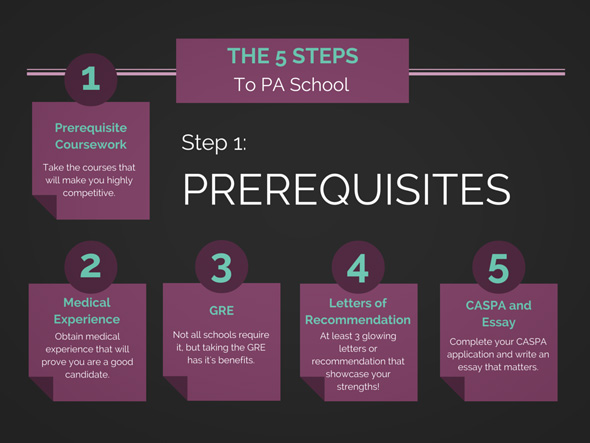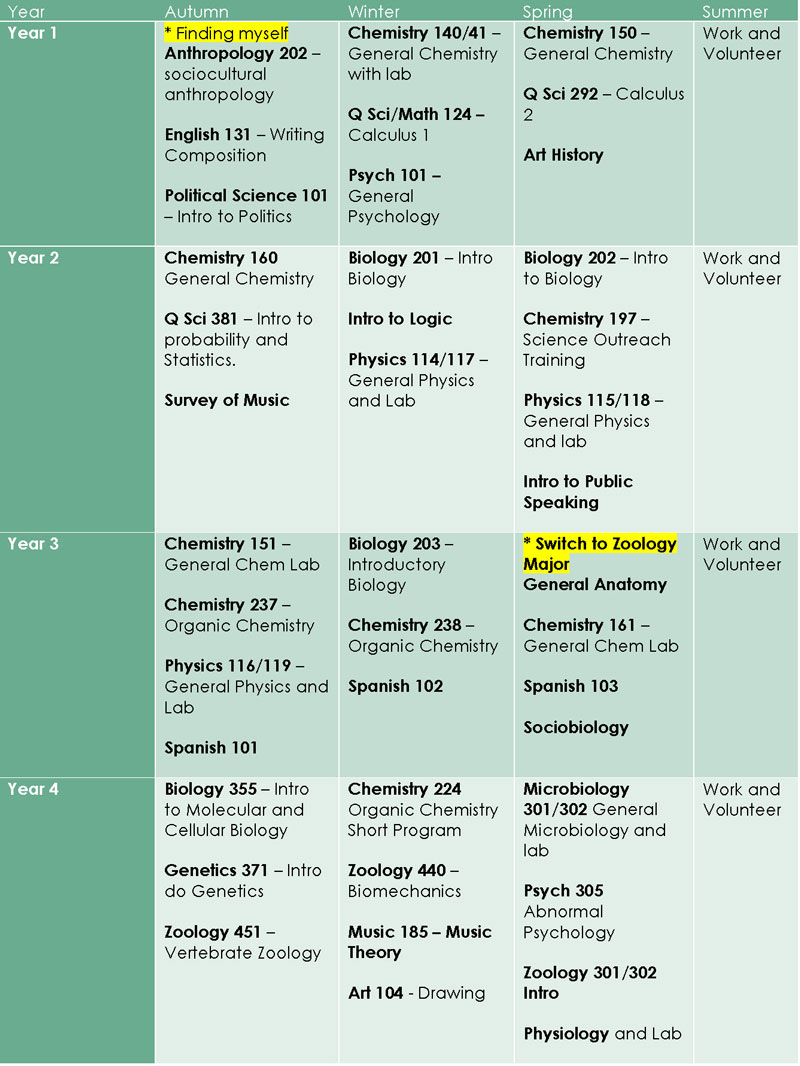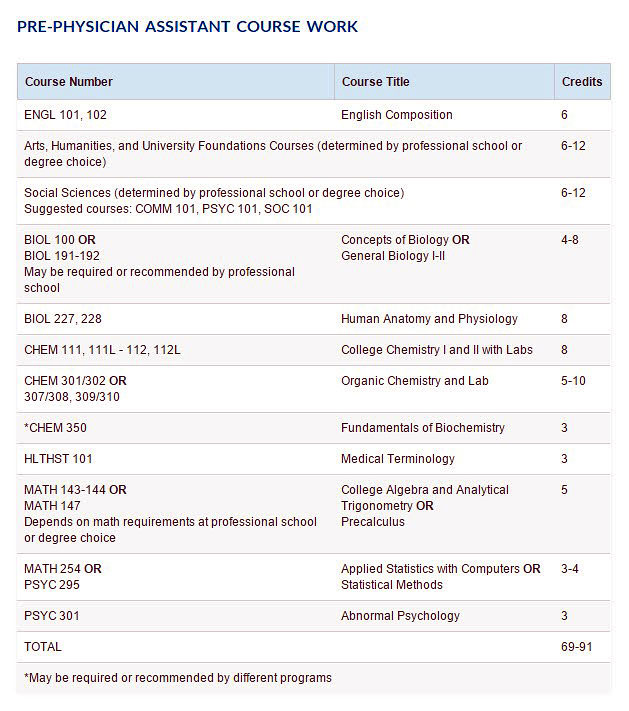
* To compare top ranking PA schools and download your FREE PA School Prerequisite Worksheet click here
This post is part of my 5 steps to PA school series to go from zero to PA school hero:
- Complete the necessary prerequisite coursework
- Obtain the required medical and hands-on patient care experience
- Successfully prepare for and take the GRE (or avoid it)
- Obtain at least 3 High-Quality Letters of Recommendation
- Complete the CASPA application Essay and all additional supplemental materials on time.
Today we are going to tackle STEP 1:
Identifying and Completing the Necessary Prerequisite Coursework
Is there a Perfect Undergraduate Course Curriculum to Get into PA School?
Upper division prerequisite requirements can be completed at a four-year institution, community college, or online courses from regionally accredited institutions. We do not look down on community college coursework. It will be factored in the same way - Penn State PA ProgramClick To TweetIf you are serious about PA school these are just some of the questions you should be asking yourself:
- What courses, if any, are considered standard prerequisite course requirements across many different PA schools?
- What schools do I want to apply to? Do they have special prerequisite course requirements in addition to the standard prerequisites I identified above?
- What courses should I take that go above and beyond the required prerequisites that will help me to stand out to the PA school admissions committee?
- What major should I choose that would allow me to complete all my prerequisite coursework and still have a career if I do not get into PA school or change my mind later?
Designing the Perfect Pre-PA School Course Curriculum to Get into any PA School
Let's start with the basics.
Prerequisite course requirements vary from school to school. That being said, there is a general curriculum that most PA schools require before matriculation.
Most programs will require at least:
- One year of chemistry with labs*
- One course each of human anatomy and physiology with labs
- One course in microbiology with lab
- One course in statistics
- One course in psychology
*Schools can be very particular about which chemistry series they prefer. It is important to consult websites of schools you are interested in, and then check with your academic adviser.
Other frequently required or recommended courses:
- general biology
- genetics
- organic chemistry
- biochemistry
- additional courses in social/behavioral sciences
- languages (some schools require coursework in Spanish)
- medical terminology
- public speaking
My Undergraduate Pre-Physician Assistant Prerequisite Coursework
No more than two prerequisite courses can be outstanding at the time of application and they need to be done by the fall of the application year. - Case Western Reserve PA ProgramClick To TweetAs a real-world example, I am going to show you my 4-year undergraduate course schedule at The University of Washington.
I was following a pre-medical track through the spring semester of my junior year. It was at this point that I spoke with an academic adviser about my career choice to be a Physician Assistant and changed majors (You will see this highlighted in yellow below).
I declared my new major in Zoology with a renewed focus on completing my pre-PA coursework. Leaving the pre-medical track opened up many options I had not previously had. I was now able to take courses in genetics, physiology, biomechanics, and microbiology, among other courses, that both increased my GPA and strengthened my PA school application.
My PRE-PA prerequisite coursework
- Anatomy and Physiology
- Upper-level Biology - 1 year
- Cellular Biology elective
- Microbiology with lab
- Upper-Level General Chemistry with lab – 1 year (3 quarters)
- Upper-Level Organic Chemistry 2 quarters with a change to the short program my senior year.
- Upper-Level Physics with lab – 3 Quarters
- Genetics
- Math - Qualitative Science" Calculus – 2 quarters with 1 quarter of statistics
- Sociobiology
- Biomechanics
- Foreign Language - 1 year
- General and Abnormal Psychology
- English Composition
Here is a detailed breakdown of my 4 years at the University of Washington (based on a quarter system)
* Finding myself: During my first quarter at the University of Washington, I joined a freshmen interest group (F.I.G) with a liberal arts focus. I had hoped to join a "FIG" focused on pre-medical sciences but, in my typical "procrastinator" fashion, I signed up too late. I spent my first quarter in college with a group of wonderful students and soon to be close friends. Although I knew I was going to pursue a degree in medicine from the start, this first quarter was not a wash. It gave me a strong supportive community of like-minded individuals and taught me that there was a world beyond the hard sciences. I then started winter quarter of my freshman year ready to tackle my medical prerequisites.
What courses are a "standard prerequisite" across many PA schools that I should take to increase my options come application time?
The goal of your undergraduate education in preparation for PA school is simple:
- Complete the necessary prerequisite coursework required to pursue your advanced degree as a Physician Assistant.
- Enjoy the process of learning.
- Avoid wasting time (and money) on courses that are unnecessary, that do not contribute directly to your primary objective or worse; prolong the time required to obtain your undergraduate degree (which will cost both time and money).
Although all PA schools have varying prerequisite coursework requirements, a systematic look into prerequisite requirements across many PA schools will reveal patterns that will help guide you.
The following table compares prerequisite course requirements from 10 different top ranking PA schools in the United States.
The 9 subjects highlighted in yellow represent common core requirements that you should pay attention to.
Overview of Physician Assistant Prerequisite Course Requirements by School (10 Top Ranking PA Schools)
Unless you are superhuman you must click on the image to view in full size or just (click here)
Key: U = Upper Level Course L = Lower Level Course X = General requirement
What courses can I take that go above and beyond the required prerequisites that will help me to stand out as an applicant?
When surveyed PA program programs value student acquisition of knowledge, skills, and attitudes needed to be a PA. Other themes include the capacity of students to graduate and become employed, valuing diversity and cultural differences, a comprehensive and strong curriculum, as well as alumni who are self-directed, lifelong learners.Click To TweetIn the above table, you will notice there are lots of boxes marked "L" for "lower-level".
You may be thinking "great, that makes my life easy"!
But stop for a minute and look at George Washington University, which requires all "Upper Level" coursework.
I could spend the next 20 minutes giving you reasons why you should avoid the low-lying fruit, but I think you can probably figure this out for yourself.
The difference between Upper and Lower Level Courses:
Let's use one of my least favorite subjects, chemistry, as an example.
At the University of Washington (UW), the Chemistry department offers Chem 110 and Chem 120: Introduction to General Chemistry and Principles of Chemistry 1. At UW this would constitute "lower level" general chemistry.
If you were to take a look at the University course catalog you will see that there is another step above Chem 110 and Chem 120: General Chem 142, 152 and 162. This is a more advanced, 1-year general chemistry series with a lab component. It is required by pre-medical students and recommended for science and engineering majors. This is the general chemistry I would recommend all serious PA school candidates take.
The same holds true for organic chemistry. In the course catalog, you will see Principles of Chemistry 2 and 3, Chem 220 and 220 - these are "lower level" courses. I would suggest Chemistry 237-239 which are upper level.
There is lower level Biology 100 and a more advanced upper-level Biology 200 series.
Do you see a pattern? You will find this across most, if not all, course offerings at all major Universities and Community Colleges.
Not convinced? Here is just one example of why you should consider upper-level courses:
My wife, who was pre-nursing, took all "lower level" science courses as a pre-nursing requirement. This was based on recommendations made by her academic adviser with a pre-nursing focus. When it came time to apply to the UW School of Nursing (the number one nursing school in the country at the time) she was surprised to discover that her prerequisite coursework paled in comparison to many of her colleagues who had chosen all upper-level science courses. To her boyfriend's dismay :-), she was not admitted into the UW School of Nursing and had to apply elsewhere. On a happy note, she was accepted to Seattle Pacific University's School of Nursing later that year!
If you do not, like my wife, you may regret it later!
Sample University Program Pre-PA Curriculum
We will accept humanities credits that are older than 5 years. Science credits must be taken within 5 years of applying. - Toro University PA ProgramClick To TweetThe following is a sample from Boise State Universities designated Pre-PA School Program curriculum.
With the growth of the PA profession, there are now many Universities offering a focused Pre-PA School Program with a targeted curriculum designed to help you get into PA school.
You may find that the Universities offering such programs often have their own PA programs and will design their curriculum around their own PA program requirements.
That being said, I have found most of these programs to be well thought out and provide the majority of the prerequisite coursework required by PA schools nationwide.
What Major Should I Choose to Get into PA School?
The last question I will touch on briefly today is the question of picking your college Major.
PA schools are flexible in the choice of undergraduate major.
Like medical schools, they care that you do well in your major (as well as your prerequisite courses) and that it reflects your interests.
I have counseled students from all different academic backgrounds and majors. Everything from dance to the more common biochemistry.
If you have certain areas of academic weakness that is OK, as long as your performance reflects an upward trajectory and a passion for the profession.
When choosing a major, it is wise to also think about alternate future careers in the event that you change your mind, or are not admitted to a PA school.
It is also wise to consider a major that may help you obtain the necessary medical experience upon graduation in preparation to apply to PA school.
Common choices for obtaining medical experience often do not require a college degree. To work as a phlebotomist as I did, an EMT or a CNA, for example, will require additional certification only. Alternatively, one could pursue a 4-year degree in nursing as an undergraduate, obtain the necessary PA school prerequisites prior to graduation, use this degree to work intensively in the field for 4-5 years gaining valuable medical experience and then apply to PA school.
OK, that is a lot of information but what is the perfect Pre-PA curriculum?
Hopefully, after reading this post you have a much better idea of how to approach your undergraduate studies. To design the perfect curriculum I have created a worksheet to help you accomplish this goal.
Here are some steps to consider:
- Make a list of the top 10 to 15 schools you would consider applying to. Go to the PAEA Program directory (which is now FREE Yeah!) and look up each school. Use the worksheet provided below to make a table of the required courses. Take special note of any "outliers" and decide if these courses are absolutely necessary to meet your application goals and if so, what are you going to do to address these prerequisites? Don't put this off until later! What if you aren't sure what PA schools you want to apply to? Start with a geographical preference and work from there. Even if you have a list of 15 random schools this will give you a good idea of what requirements you will need to satisfy.
- Where are you right now? This is going to help you build a timeline to complete the necessary prerequisite coursework. Take your worksheet and meet with an academic adviser at your University or the local Community College who can help you design a course curriculum that will meet your needs.
- Take upper-level courses. You can take the easy road and meet the minimum requirements, but I would avoid this if you can. From my own experience, and as you can see from the chart I created above, upper-level courses will not only give you more options come application time but will also make you much more competitive as an applicant.
- Focus on your education: You need to make your academic coursework your top priority. If you are going to work while attending school pay careful attention to how it is affecting your academics. In my case, working part-time at the campus health center 2 hours a day, helped me focus and improved my academic performance. But this is not always the case. If you are a returning student, have a part-time or full-time job or if you are a parent, make sure to schedule time for your studies and make sure everyone else is on board.
The PRE-PA Prerequisite Worksheet
Click here to download your FREE PA Prerequisite Worksheet.
I will be back shortly to discuss number two: Obtaining the required medical and hands-on patient care experience, so stay tuned!
- Stephen Pasquini PA-C
View all posts in this series
- How to Write the Perfect Physician Assistant School Application Essay
- Prerequisite Coursework: How to Design the Perfect Pre-PA School Curriculum
- Healthcare Experience Required for PA School: The Ultimate Guide
- Secrets of Successful PA School Letters of Recommendation
- The GRE and PA School: The Pre-PA Advisor Series



















Hello Stephen,
I am an IMG , just got my MD certificate but match in the US for me is kinda impossible. Thats why I started my PA study journey. Online courses vs In campus is my main concern here. Any idea?
Thanks .
Hi Mustafa, it depends to some extent on the schools you will be applying too. Most schools accept online courses but there are some that don’t and to make it more difficult they do not always tell you on their website so you have to do some digging. In that regard, most school also accept community college courses but there are again, some that do not. Start by doing finding schools that accept International students and meet your requirements. You can do that here at my PA program picker: https://www.thepalife.com/pa-program-picker/
Then check that against the list here at the PAEA directory website: http://directory.paeaonline.org/programs?utf8=%E2%9C%93&state=°ree=&caspa=&gre=&health_xp=&bach_required=&min_gpa=&start_month=&intl=1
Export your list of schools on the PA program picker into an Excel Spreadsheet and start doing some research. Contact the schools and find out there list of prerequisites and if they do take online coursework. This will give you a good foundation from which to work from!
Stephen
Hello,
I’m not sure how old this post is, but I have a question regarding the upper division prerequisites.
I just recently graduated with my BS in Public Health and have always had the goal of becoming a PA.
I have leadership experience and have healthcare experience working as a CNA, health scholar at Hoag Hospital in Newport Beach, and also working in cancer research.
Unfortunately, I did not take upper division Bio courses as I have seen most schools require, such as genetics, when I was at the university.
What would you recommend for this, other than of having to go back and get a second bachelor’s because I did not take one science course that was required?
Please advise! Thank you!
Hi Stephen,
I am trying to transition into the PA program from what I am currently doing. I have a masters degree in Social work from Catholic University of America and I am working as a social worker. However, I did science in high school after which I studied microbiology in my undergraduate for a short period of time. I would like to know the classes or courses to take for a PA program. Thank you.
Hi Ama, a good place to start is at the PAEA PA Program Directory website. Here is an example from Arizona School of Health Sciences http://directory.paeaonline.org/programs/1023. You can see what prerequisites are required by each school. Make a spreadsheet (you can use the download included with this post: https://s3.amazonaws.com/palife-downloadables/PA+SCHOOL+PREREQUISITE+WORKSHEET.docx). Community college coursework is just fine!
Stephen
Hi Stephen,
I am planning on applying for a Bachelor’s program soon, but cannot decide on a degree to choose! I am considering just getting my Bachelor’s in biology from a local university near me, but am now wondering if a more specialized degree would make me more competitive for PA school (such as microbiology or nutrition). Would a degree in biology be adequate? Also, would a degree in nutrition count?…… would that be acceptable as well?
Stephen,
I am a non-traditional (32 y/o) student who has suddenly awakened to realize I want to become a PA. Over the last couple of weeks I have taken in a lot of information and the website in particular has helped me immensely. Because I’m a non-traditional student who requires a Full time job, I cant completely throw myself into full time schooling (for bachelors degree) although I know I will have to find a way in PA school.
I have worked in the medical field for nearly 13 years as a nurses aide, basic EMT, Monitor tech and Food and nutrition manager responsible for a 450 bed facility and 110 direct reports. So my questions are:
1) Would this kind of experience stand out on an application for PA school?
2) Because working full time during this transition is a must, am I in danger down the road to PA or is this a realistic opportunity? Given my schedule I’m looking at a 6-8 year adventure to PA
3) I spent 4 years at the Pittsburgh institute of Art in the Video game design program. I had a 3.25 GPA after 91 credit hours. would this hurt me when applying?
Thanks in advance for any information you could provide.- Randy
Hi Stephen,
How would the breakdown of the college schedule look like on a semester system since my university doesn’t go by quarters?
Hey Stephen,
I’m planning to take additional courses to boost up my science gpa along with taking an additional psychology course for certain programs. My question for you is whether programs prefer students to take courses at an accredited university (i.e University of South Carolina, Lander University,) or would a technical college or community college (i.e Spartanburg Community College, Central Piedmont Community College) be okay since I’ve already graduated from a 4-year university.
Funny you should ask as I have a blog post to answer this question in the works. In my interviews with admin directors all say that community college credit’s are just fine and considered to be equivalent to those taken at a four year university. Especially if you are taking additional courses or retaking courses this can be a very effective (and more cost efficient way) to go about it.
I wish you the best of luck!
Stephen
Hey Stephen:
Great website….Needed some advice from the prerequisite classes you took to get into PA school…
.
I am currently retaking classes at a pre-requisites at a community college….(my classes are expired now).
Did you take an Intro to Biochem class? Will that be acceptable at all PA schools (if I take it a community college….200 level course (Chemistry 260, that’s what it is called)?
Also the following Upper-level courses you took:
Upper-level Biology – 1 year
Upper-Level General Chemistry with lab – 1 year (3 quarters)
Upper-Level Organic Chemistry 2 quarters with a change to the short program my senior year.
Upper-Level Physics with lab – 3 Quarters
Could you pls expand upon them…..as to what you mean upper level? Were they intro classes, but just for science majors that’s why you call it upper level?
I am planning to take science courses for science majors (introductory level) at a community college. Will that be ok to fulfill the pre-req’s for all PA schools?
I was hoping to take classes so that it could be accepted broadly….without any difficulty when I apply to any school….Would really appreciate your recommendations.
Thanks in advance for your suggestions!
Thanks for the informative article. I am currently an Environmental Public Health major and was on the pre-med track. I am currently a sophomore finishing up Organic Chemistry 2 as well as the lab. I know I am most likely retaking it as I’ve struggled all semester. I have a B- in General Chemistry 1 and a C- in general chemistry 2 (i know I’ll have to retake that as well). Other than that I have B’s in Ochem 1 and Bio 1 and will soon pass Bio 2 with either a B+ or A-. My school’s Chemistry department has actually been under probation for failing to many students, most of the professors spend little time teaching and are here for research but I know it’s no excuse for my poor performance. My current major is very demanding and has little room to retake classes so I will most likely be graduating late.I plan on taking an STNA course over the summer as well as volunteering at a hospice center. I’ve recently done some soul searching and realized I wanted to pursue PA school. Any tips on what to do here? I can retake Organic 2 with grade forgiveness but my school won’t allow grade forgiveness for general chemistry 2. Should I take this at CC? The only possible HCE I have previously was that I volunteered at a hospice center in Highschool, would those hours count? Am I too late?
Stephen,
I want to thank you for your articles. They are very positive, yet realistic about the expectations of becoming a PA. I am seriously considering the option of Pre PA school after being a stay at home mom with a child who has communication disorders. My degree is in business however! I always found myself “humanizing” the business world because of my need to help people in a meaningful way. I am looking forward to this journey!!!
Dear Stephen,
Do you know if most PA programs need their prerequisites taken within a time limit of for example five years or so?
Hello,
I have a question about taking prerequisites as a graduate. I am currently a senior at a state liberal arts school in NY. I only recently discovered that I think a career as a PA would suit me, but I’m about to graduate with a BA and no prerequisites done. So, I was wondering if you had any insight on what would look better on a PA school application: if I were to take the prereqs as a non-matriculated student at a different university, or, if I should consider applying to a post-bac program?
Hi Sarah,
This is a great question! As long as you get your prerequisites done it doesn’t really matter where they come from, community college is a perfectly fine option as well. I would just make sure to choose the “upper level” science courses that would be considered part of a pre-medical curriculum… PA schools like to see that you are able to thrive in the face of challenging courses. I also think as a “non-traditional” major you have you a bit of an advantage, especially if you can turn around and crush it on your prerequisites while making sure you have a sufficient about of hands on healthcare experience.
Stephen
Hi Stephen,
I am trying to strengthen my sGPA (it is 3.23). My prerequisite GPA is currently 3.8. I want to take science classes at Community College but I am afraid it will look bad because they’re lower division. But I am also planning on taking Ochem and Biochem. So it’s not like I am trying to slack off with the upper division courses. The courses at the university is really expensive, and I can’t afford it. So my question: is it okay to take lower division courses to raise my sGPA?
Thank you,
Anne
Hi Stephen!
I am currently a first year bio major but I am considering changing to human bio and society and my school offers a BA or BS. Does one of these look better when I apply to PA school or does it have no affect?
I would probably lean towards a BS degree although in all actuallity it probably doesn’t matter. Most schools are going to look at your science and overall GPA and just make sure you have all the requirements completed. At the end of the day applicants start looking a lot alike so you are going to want to focus on things that can set you apart… Often times is lies outside the realm of coursework.
Stephen
Hey!
I am a sophomore in college at Reinhardt University in Georgia. I am majoring in General Biology, and minoring in math and Spanish. I want to become a PA. What do I need to do to prepare and be ready to apply to Pa programs? I currently have a 3.7 GPA ,while playing a sport in college. I have been working on volunteer hours to add to my resume. Some PA programs require paid experience hours, what would you suggest I do for that? I want something quick and easy, but that will still look good on my resume. Please let me know if you have any other thoughts or info to help me out!
Thanks!!
Hi,
Quick question, I ended up receiving a B in a statistics course. Should I consider retaking it as I work on my application for PA school?? Between my medical scribe job and college athletics I slipped up on the final and didn’t finish as strong as I could have. Kind of freaking out about it
Hi Cody,
I don’t think this is a big deal at all, and personally (although I may be wrong) I don’t think repeating it would be a good use of your time. There are so many other things you could do instead that would beef up your “resume” and a B is a 3.0. If you got a D, I may change my response, but I wouldn’t fret about it.
Stephen
What other ideas do you have to beef up the resume?
Hi Chris,
An admission director from Ketchum University PA program said this: “All applicants look the same with their GPA, HCE and LORs. What sets you apart, to me, is your leadership positions. I will always extend an invite to the class or established medical club president.”
I like to see activities that demonstrate compassion and community involvement such as unique volunteer activities – working in underserved communities, global health experience, time spent in the children’s hospital, working with special needs patients, veterans, working with HIV/AIDS populations, senior centers, homeless shelters… anywhere and everywhere there is a need. Going above and beyond the general call of duty shows initiative.
Also, an amazing letter of recommendation can make a big difference. Here is one I pulled off the PA forums. Read this and tell me if you would like to interview this candidate?
To Whom It May Concern,
It is my pleasure to submit this letter of recommendation for Ms. JamieNicole3x. I direct the Chemistry Success Center (CSC) at [University], a center that provides free walk-in chemistry tutoring services. Jamie works as a tutor in the CSC, and I have been her supervisor since August 2014. Scientific knowledge is a prerequisite for employment as a tutor, and Jamie demonstrates an excellent understanding of general chemistry, organic chemistry, and biochemistry. However, the traits that make Jamie stand out as a truly exceptional tutor extend far beyond her strong scientific background. In the ten months I have known Jamie, I have been greatly impressed by her professionalism, communication skills, and initiative.
Jamie consistently demonstrates an incredible level of professionalism. Jamie is, without a doubt, the most dependable and responsible student I have had the privilege of supervising. She is punctual and responds to all communications quickly and professionally. This past semester, Jamie opened the CSC two days per week. I typically stop by the CSC every morning to make sure things are set up and running smoothly. However, I quickly realized that I did not need to check in on the CSC on days when Jamie opened the center – I could rely on her to get things done correctly.
Jamie also stands out as an excellent communicator. She is personable and approachable, and students feel comfortable asking her questions. Additionally, she is adept at communicating with both her peers and chemistry faculty members. She manages to connect with people through humor, excellent listening skills, and a positive demeanor, all while maintaining appropriate professional boundaries. Students appreciate Jamie’s strong communication skills, and she consistently receives praise on student evaluations for her ability to explain things clearly.
Finally, I would be amiss not to mention Jamie’s initiative. Jamie excels at recognizing where help is needed, and never hesitates to deliver needed assistance. Whether it’s stepping in to help when another tutor needs support in dealing with a difficult student or taking the time to organize CSC resources, Jamie always pitches in to help without being asked. She truly leads by positive example.
I am confident that JamieNicole3x possesses the personal characteristics and academic preparation needed to succeed in a physician assistant graduate program. I recommend her for admission to your program without reservation.
Please do not hesitate to contact me if you need additional information.
Best wishes,
[Name Removed]
Affiliate Professor of Chemistry
Very weird to find my letter of rec copied and pasted. If you’re interested in me, I’m jamienicole3x on all social media, including Reddit where this post was taken from.
Hello Stephen! I’ve been wondering about an aspect of the pre-reqs, and I haven’t found the answer here or on other PA blogs… Does it matter where you complete your pre-reqs at? I graduated with a B.S. in Biology last year and am currently living at home on the other side of the state now. So, ideally I was thinking of taking pre-reqs at a Community College near me..
1. Does it look good if you take pre-reqs at a Community College vs. a University?
2. Will PA schools accept your pre-reqs regardless of where they were taken? Or do they need to be taken at a partner school, or a full-fledged university? Do different schools have different requirements of where you take your pre-reqs? – Does it work the same as “transferring” credits between a CC and undergraduate program? Or is it just a “check-mark” that you completed the necessary courses anywhere?
3. Does it look bad if you take your pre-reqs at different places? Ex: If I decide to go to one CC for a certain course or two, decide I don’t like it, and decide to take my other courses at another CC?
I want to sign up for some pre-req courses soon, preferentially a winter course, so I can finally get my career path rolling again. I kindly await your reply!! Thank you!
Hello Stephen,
I have curiosity about becoming a PA. I have about nine and a half years experience as a x ray tech in the military but no degree. I know each school has their own specifics as far as transferring experience and military schools to college credits. I’m curious if my experience as an x ray tech would be sufficient to meet the required medical experience? I have performed those duties for orthopedic surgeons, emergency room traumas, fluoroscopic procedures, and regular diagnostic imagery.
Also what would be a good start and path. I am 35 years old and almost ready to retire from the military and pursue a new path. I currently live in Tacoma and see you are very familiar with the schools in Washington state. Any help or guidance would be great. Thank you for your time.
Hey! Stephen!
I am currently in Canadian High school, and I’m submitting university application very soon. (I’m applying to Canadian uni only)
I’m applying to Kinesiology as my first choice, and General Science as a second choice, but I was wondering if Kin is a good choice for Pre-PA degree. Also, do I have to have strong Physics background for PA school?
Thank you so much for your help! 🙂
Hi katie,
Kinesiology is a wonderful major for PA school. My cousin went that route and even worked as part of her college football teams training team. She is now a very successful orthopedic PA. As far as physics is concerned review some of the prerequisites required by the programs to which you are applying. I took 1 year of pre-medical physics and really enjoyed it. You can find a lot of information regarding prerequisite coursework on the PAEA directory pages or by visiting the school specific website.
Warmly,
Stephen Pasquini PA-C
http://www.thepalife.com
http://www.smartypance.com
Hey Stephen! I’m trying to transition into the PA field from what I’m currently doing. I’ve been working as an experienced pharmacy technician for two years. My original goal was to become a pharmacist, but I don’t think it’s the right fit for me anymore.
I’m trying to get more experience on the side. Applied to some part time jobs dealing with phlebotomy and also gonna volunteer at my local hospital. I’m also trying to get my pre-reqs done at the same time. My top school is Northeastern, but I’ve been looking at others just in case. I’m trying to go for the more realistic options (because some schools ask for different kinds of pre-reqs and such). I was a chemistry major in undergrad, so I need to complete A&P and Microbiology.
What is your opinion on taking them at a community college? I’ve been looking to take A&P with lab this semester, but I’m depressed over the costs per credit. At the same time I’m afraid of taking the risk in taking them at a CC and not having them accepted. They say an accredited 2 year university suffices in some of the pre-reqs so I wonder if that’s okay.